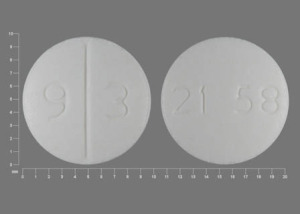Trimethoprim pronounced as tri-meth-oh-prim is a medication used in the treatment of bacterial infections. Its mode of action is by killing certain types of bacteria. To identify whether the tablet is suitable for you, keep clear about the action mechanism of trimethoprim tablets and possible side effects.
How Do Trimethoprim Tablets Work?
Trimethoprim tablets, an antibiotic, act by preventing the production of folate by the bacteria. This folate is essential for the bacteria to synthesize their DNA and multiply, as they cannot use the folic acid available through diet. When the folate production does not happen, no new bacteria are produced and the infection does not spread. The remaining bacteria get killed by the immune system of the body. The type of bacteria, however, needs to be determined prior to treatment by taking a tissue sample like urine or sputum.
The trimethoprim tablets can be used to treat conditions like urinary tract infection caused by bacteria, prevent recurring UTIs and treat acute bronchitis, chronic bronchitis flare up, pneumonia caused by Pneumocystis jirovecii.
Are Trimethoprim Tablets Suitable for Me?
Trimethoprim tablets should be taken with care and the doctor should be informed of the entire medical history before this medicine is prescribed. The medicine may become unsuitable over a period of time as well. The medicine may or may not be prescribed to some individuals and a lot of care is taken before prescribing it, e.g. in below cases:
- Elderly, pregnant and child below age of six years
- Having kidney problems or are undergoing dialysis
- Folic acid deficiency or blood problems
- HIV infection
- Allergic or sensitive to the medicine or other ingredients present in the tablet
How Should I Take the Trimethoprim Tablets?

1. Read Instructions
The label provided along with the tablets should be read carefully before taking the medicine to be aware of how to take the medicine and the full list of possible side effects.
2. Follow Correct Dosing
The medicine should be taken only as prescribed as it depends on whether it is being given for treating infection or for preventive measures. 200 mg twice daily for infection and 100 mg once for prevention is the dosage for adults. Children are prescribed liquid medicine and dose should be correctly measured.
3. Spacing the Medicine
There should be gap of 12 hours between each dose when prescribed twice daily and can be taken before or after meals.
4. Complete the Course
To prevent recurrence of infection, it is important to complete the course given which can last from 3-14 days. You should stop only if told to by the doctor.
5. Do Not Miss Dose
Avoid missing a dose. When you do forget, take it immediately when you remember. However, if you remember only at the time of second dose, miss the first dose. Never take 2 doses together.
Are There Any Side Effects of Trimethoprim Tablets?
Medicines usually have certain side effects associated with them. Given below are some of the known side effects of trimethoprim tablets, however, not all people would experience these side effects:
- Nausea, vomiting and headache
- Rash and itching
- Thrush infection due to overgrowth of the yeast, Candida. Doctor should be informed immediately.
- Increased blood potassium levels (hyperkalaemia)
- Disturbance in blood cell production, inflammation of bowel lining, photosensitivity
- Stevens-Johnson syndrome, toxic epidermal necrolysis, liver or kidney disease
Things to Look Out For
Medication Interactions
Some medicines might interact with trimethoprim tablets, hence it is important to inform the doctor about all the medicine you might be taking. The medicines which can interact with trimethoprim are given below:
- Ciclosporin
- Digoxin
- Warfarin
- Phenytoin
- Pyrimethamine
- Rifampicin
- Myelosuppresives
Medical Conditions
Certain conditions might also interact with trimethoprim tablets. The doctor or pharmacist should be informed of any such condition:
- If you are pregnant, trying to conceive or breast feeding.
- If you are on any prescription, OTC medication, herbal medicine or dietary supplements.
- If you are allergic to any medicines, foods or other substances.
- If you suffer from liver or kidney conditions, asthma, G6PD deficiency or HIV infection. Have blood problems like anemia, porphyria or thyroid problems.
- If you suffer from folic acid deficiency i.e. low folate levels in blood or at risk to develop it. This can happen if you have problems with absorbing nutrients, are elderly and are alcoholic or taking medicine for seizures.
- If you have had problem with high blood potassium levels.
